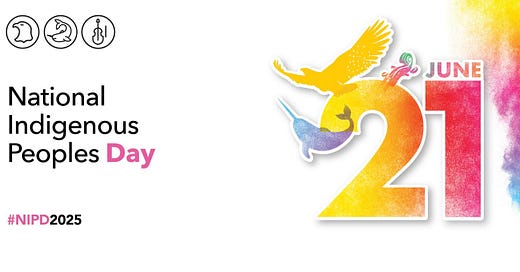Honouring Indigenous Leadership and Deepening Our Commitments
On National Indigenous Peoples Day, we reflect on what real solidarity and shared advocacy must look like
Every year on June 21, National Indigenous Peoples Day invites us to celebrate the cultures, histories, and ongoing contributions of First Nations, Inuit, and Métis peoples across what is now known as Canada. It is a day rooted in the significance of the summer solstice, when many Indigenous communities have long gathered to honour tradition, spirit, and connection to land and each other. But celebration cannot exist without truth. And truth cannot exist without accountability.
The responsibility to acknowledge and address past and ongoing harms against Indigenous Peoples is one that belongs to all of us. Especially those of us doing advocacy work in health, justice, and equity. For me, National Indigenous Peoples Day is not only a time to honour the rich diversity of Indigenous cultures, but also a moment to ask what my work does, or fails to do, in advancing the rights and dignity of Indigenous people living with HIV.
The intersecting impacts of colonialism, racism, and systemic neglect continue to shape health outcomes for Indigenous communities. According to CATIE, Indigenous people remain disproportionately affected by HIV in Canada. This is not a reflection of individual behaviour. It is a reflection of structural violence. It is not enough to name these realities. We must confront them with action, humility, and a willingness to step back and listen.
In my advocacy, I often speak about U=U. Undetectable equals Untransmittable. It is a powerful message rooted in science and hope. But it cannot reach its full potential if it is not grounded in equity. If U=U is to be a truly liberatory message, it must be made accessible to all people living with HIV. That includes those who have been most marginalized by Canada’s healthcare systems. Indigenous people must be part of the leadership, the storytelling, and the decisions about what U equals U looks like in their own communities.
This day is also a reminder that the work of reconciliation is not symbolic. It is material. It shows up in whose voices are heard, whose needs are prioritized, and who is resourced to lead. My role is not to speak for Indigenous people. My role is to advocate alongside, to learn continuously, and to use whatever platform I have to shift power rather than simply share it.
There are Indigenous leaders in the HIV movement who have shaped the national response in profound ways. Their wisdom, lived experience, and cultural knowledge have long offered guidance that too many organizations have ignored. That must change. If we are serious about ending stigma and addressing the root causes of health inequities, then we must centre Indigenous leadership. We must invest in Indigenous-led solutions and reject colonial models of advocacy that exclude or tokenize.
This work is not abstract. It happens in boardrooms, funding decisions, conference spaces, and community programs. It happens in how we design campaigns, whose stories we amplify, and how we respond when called in. It happens when we say we care, and then prove it through action.
So today, as I recognize National Indigenous Peoples Day, I am also recommitting to the work of dismantling systems that continue to cause harm. I am reflecting on my role within those systems, and how I can continue to be more intentional, more responsive, and more accountable.
There is no justice in the HIV response without justice for Indigenous peoples. There is no true equity if we continue to leave the most impacted behind. Let this day be more than a social media post. Let it be a catalyst for deeper partnerships, renewed commitments, and sustained action.
To learn more about the significance of this day, visit the Government of Canada’s official resource on National Indigenous Peoples Day. Read. Reflect. Listen. And then ask yourself. What will you do next?
If this post resonated with you, please share it and subscribe to receive future reflections and advocacy updates.




